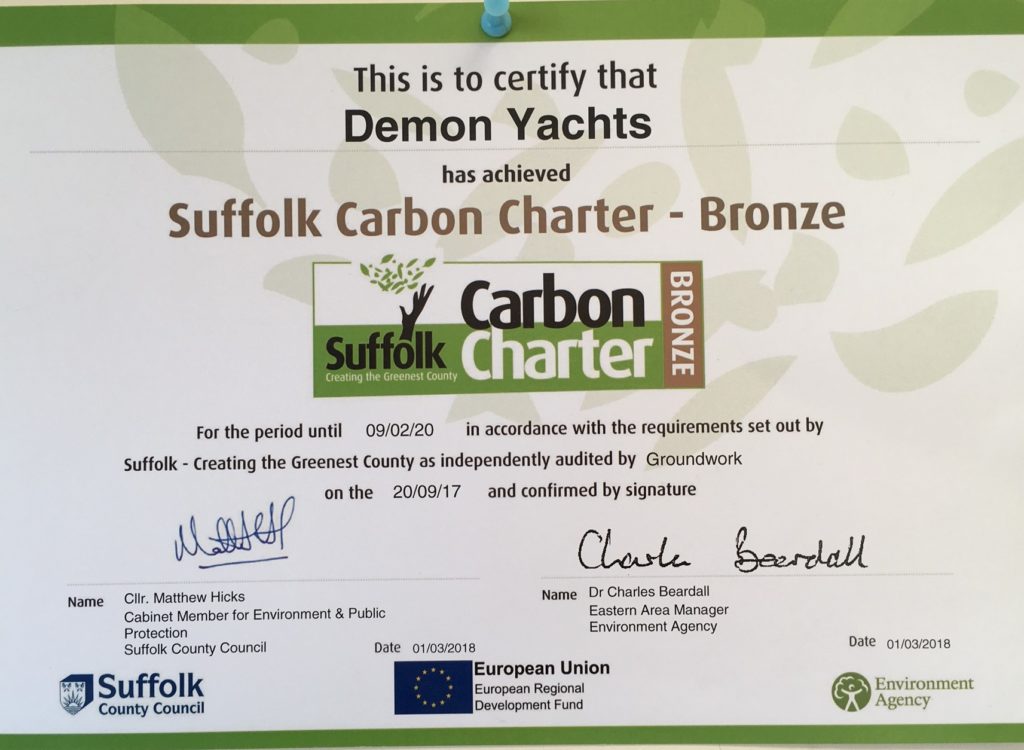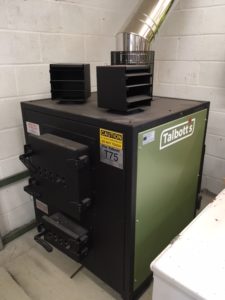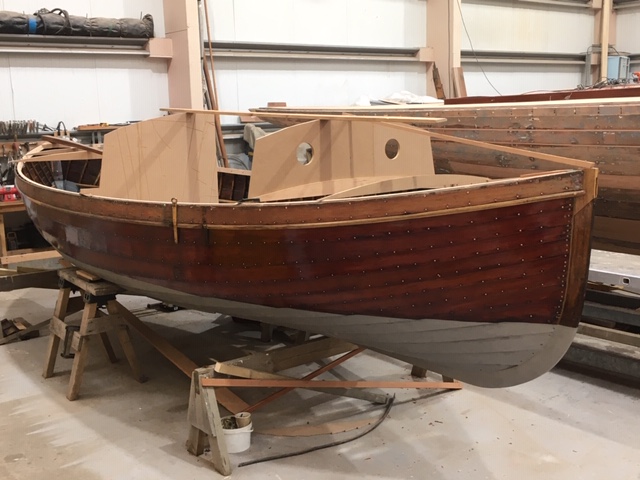Demon Yachts’ commitment to carbon reduction

In the autumn of 2017 we were delighted to be awarded a bronze level Carbon Charter by Suffolk County Council and the Environment Agency, in recognition of our commitment at Demon Yachts to reduce our carbon footprint.
Taking this a stage further, during 2018 we applied for a grant from the European Regional Development Fund to support our significant investment to enable us to upgrade our heating and lighting system whilst at the same time lowering our carbon footprint.
The lighting system upgrade included changing all our fluorescent tubes to LED strip lights, and changing our lighting in the main workshop from high-pressure sodium lights to LED. We also needed to change the outside light to LED and include a PIR so as to ensure it was only on when needed.
The main workshop area is heated by 2 Air-Source Heat Pumps (ASHP), but what we had discovered is that in periods of very cold weather these pumps were not up to the job, despite working flat out. So our grant application included support for the purchase of a commercial multi-burner unit, in the form of a Talbott T75. Those of you who are familiar with the history of the Aldeburgh Boatyard may be raising an eyebrow at this point (boatyard & wood burner? Hmm, sounds dangerous, and haven’t we been here before …), but the new unit would be nothing like the old one in the old building, and perfectly safe! What’s more it would be fuelled by the offcuts from the workshop and other waste wood.
On the 16th of July our grant application was approved, and work started immediately. The lights were quickly upgraded, and the immediate comment from the workshop in particular was that the new lights were so much brighter! Shortly after that the wood-burner went in, with its new external stainless steel chimney. We couldn’t actually try it out till the following winter, but it is certainly true to say that nowadays in cold weather the warmest place in the building is the workshop! So now everybody is happier at work, paint, varnish and epoxies all go off correctly, our waste wood is disposed of safely, and we’re saving electricity.

So here we are in 2020 and we are starting the process again to renew our Carbon Charter, with the intention this time of aiming to be awarded a Silver Level. OK, what further changes and investment are we planning to make to reduce our carbon footprint further? Well, the first point to report is that the changes we made in 2018 have had a positive impact on our carbon footprint, so that’s a good start. However, we want to go further and are looking at the possibility of introducing more new schemes:
First up, with the increase in Electric Vehicle (EV) sales nationally and globally, and the general direction that the motor trade and national governments are heading in, we are anticipating a significant rise in the number of EV cars visiting Aldeburgh. Aldeburgh has only one public charging point in the town at the moment, so Demon Yachts is considering installing at least one charging point in front of the building which will be available for visitors to the town to use (for a price!). And whilst no staff member runs an EV yet, we do have two who now regularly cycle to work and one who commutes on foot.
Next, we are looking into the possibility of installing solar panels on the workshop roof. Our workshop faces south, so is ideal for the task, and this should contribute significantly to the reduction of our energy bills.
Thirdly, we are researching the possibility of harnessing wind energy by installing a wind turbine, either on the workshop roof, or on its own pole further down the back field. Located where we are, facing into the prevailing wind, we are very conscious of the amount of wind that flows across Aldeburgh, and we aould like to tap into this natural resource.
Finally, we are continuing to promote green, clean electric propulsion for boats, through sales of Torqeedo electric motors, both outboard and inboard. We are also keen to encourage owners of motor boats and cruising yachts to consider greener boating by converting either to a fully electric alternative, or a diesel hybrid engine. Not only is this a cleaner solution for our planet and its oceans and rivers, but it will also make a significant reduction to boating costs. Our first project is a Camper & Nicholson’s launch which is currently being restored in the workshop and will be fitted with an all-electric auxiliary engine.

As you can imagine, these initiatives are going to cost quite a lot of money, so the first step is to research what grants may be available to us to help with the finances.
Keep an eye on this page as we’ll be updating it regularly to let you know about all our green initiatives and the progress that we are making.
